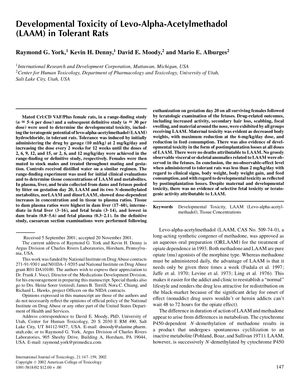Developmental Toxicity of Levo-Alpha-Acetylmethadol (LAAM) in Tolerant Rats
March 2002
in “
International journal of toxicology
”

TLDR LAAM caused developmental toxicity in tolerant rats without causing birth defects.
In a study conducted 22 years ago, researchers investigated the developmental toxicity and teratogenic potential of levo-alpha-acetylmethadol (LAAM) hydrochloride in rats that had developed tolerance to the drug. The study included a range-finding study with 5-6 rats per dose and a definitive study with 30 rats per dose. Tolerance was established over 12 weeks with increasing doses of LAAM. Pregnant rats were then treated with LAAM throughout mating and gestation, while control rats received distilled water. The range-finding study assessed clinical effects and measured tissue concentrations of LAAM and its metabolites. Results showed dose-dependent increases in LAAM concentrations in various tissues. The definitive study involved caesarean section examinations and teratologic assessments of fetuses on gestation day 20. Maternal toxicity was observed, including decreased body weights and reduced feed consumption. Developmental toxicity was indicated by postimplantation losses at all doses, but there were no LAAM-related deaths or observable fetal anomalies. The study concluded that the no-observable-effect level for LAAM in tolerant rats was less than 2 mg/kg/day, with no evidence of selective fetal toxicity or teratogenic effects.




